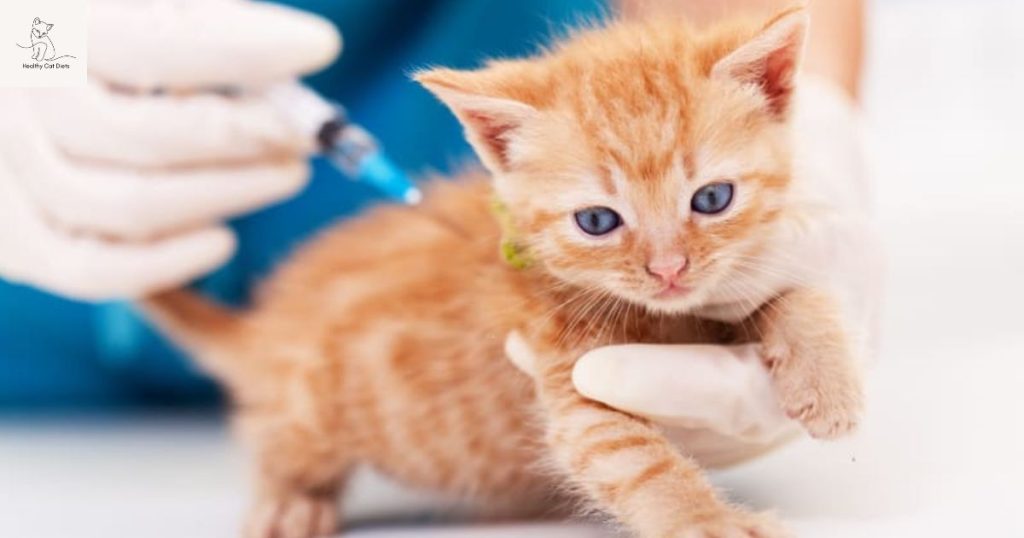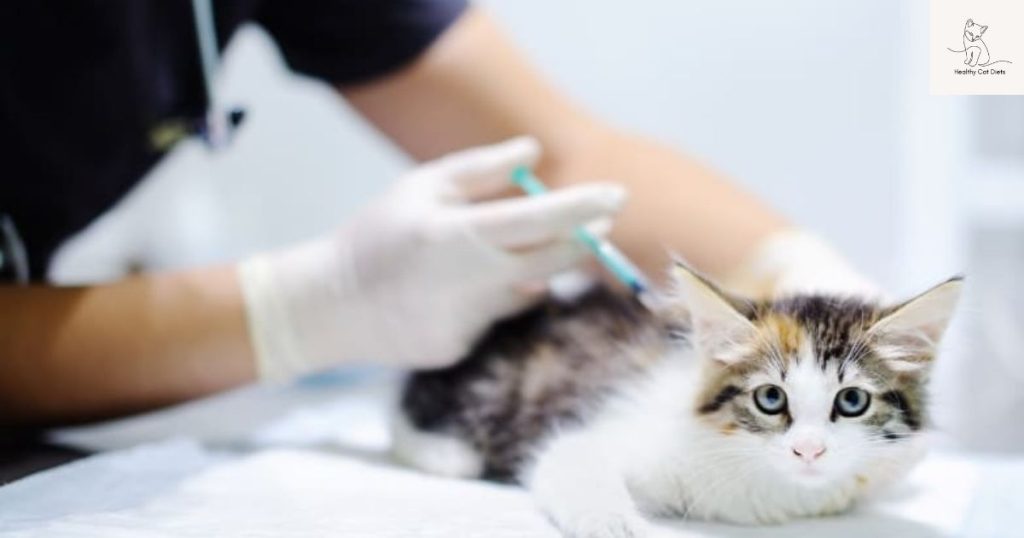Introduction
Vaccination is a crucial aspect of responsible pet ownership, and the FVRCP vaccine stands out as a cornerstone in feline health care. As a core vaccine, it provides essential protection against severe viral diseases that can significantly impact a cat’s health and well-being. By vaccinating your cat, you not only safeguard their health but also contribute to the broader community by preventing the spread of these infectious diseases.
Understanding the importance of the FVRCP vaccine can help cat owners make informed decisions about their pets’ health. This vaccine is typically administered during kittenhood, but its significance continues throughout a cat’s life, requiring periodic boosters. In this article, we will explore the specifics of the FVRCP vaccine, its benefits, and what cat owners need to know to ensure their feline friends remain healthy and protected.
What is the FVRCP Vaccine for in Cats?
Overview of the Core Vaccine
The FVRCP vaccine is a combination vaccine designed to protect cats against three major viral diseases: Rhinotracheitis, Calicivirus, and Panleukopenia. These diseases are highly contagious and can be fatal, especially in young kittens or unvaccinated cats. As a core vaccine, the FVRCP vaccine is recommended for all cats, regardless of lifestyle, due to the potential risk of exposure to these viruses.
Protection Against Rhinotracheitis
Rhinotracheitis, caused by the feline herpesvirus, is a leading cause of respiratory infections in cats. Symptoms may include sneezing, nasal discharge, and conjunctivitis. Cats infected with rhinotracheitis can suffer from recurrent flare-ups throughout their lives, especially during stressful situations. The FVRCP vaccine significantly reduces the severity of symptoms and helps prevent the spread of the virus among cats, making it essential for both indoor and outdoor cats.
Defense Against Calicivirus
Calicivirus is another respiratory pathogen that can cause similar symptoms to rhinotracheitis, but it can also lead to more severe conditions, such as pneumonia or systemic infections. Cats can develop ulcers in their mouths and experience joint pain due to this virus. The FVRCP vaccine provides vital protection against Calicivirus, helping to ensure that cats can maintain their health and vitality.
Immunization from Panleukopenia
Panleukopenia, often referred to as feline parvovirus, is a highly contagious and potentially lethal disease. It primarily affects kittens but can impact cats of all ages. The virus attacks the bone marrow, leading to severe drop in white blood cells, making infected cats highly susceptible to secondary infections. The FVRCP vaccine is crucial in preventing this disease, providing immunity and protecting vulnerable kittens from severe health risks.
How Many FVRCP Shots Do Kittens Need?

Initial Vaccination Schedule
Kittens typically receive their first FVRCP vaccination at around six to eight weeks of age. This initial shot is part of a series designed to build immunity against these deadly diseases. It’s essential to start this vaccination process early to ensure the best protection as kittens are particularly susceptible to infections.
First Set of Shots
The first set of FVRCP shots usually consists of two to three doses, spaced about three to four weeks apart. This schedule allows the kitten’s immune system to respond effectively to the vaccine, creating a strong defense against the targeted viruses. By the time the kitten reaches 16 weeks, it should have completed the initial vaccination series, significantly reducing its risk of contracting these diseases.
Subsequent Booster Shots
After the initial vaccinations, kittens will require annual booster shots to maintain their immunity. Adult cats typically continue to receive boosters every one to three years, depending on the veterinarian’s recommendations and the cat’s lifestyle. Regular booster shots ensure long-lasting protection, helping to keep your feline friend safe from these potentially fatal viruses.
Importance of Completing the Vaccination Series
Completing the FVRCP vaccination series is crucial for the long-term health of your cat. Missing a shot in the series can leave the cat vulnerable to infections. Regular veterinary check-ups can help ensure that your cat is up-to-date on vaccinations and receive necessary boosters. Taking these steps can help your cat lead a healthier, happier life.
Is FVRCP the Same as Distemper?

Understanding Distemper in Cats
While the term “distemper” is often associated with dogs, feline distemper is a different disease, primarily referred to as panleukopenia in cats. Distemper in dogs is caused by a separate virus and affects dogs specifically. In cats, panleukopenia is the primary concern and is included in the FVRCP vaccination. Understanding this distinction is essential for pet owners to ensure they provide the right protection for their furry friends.
Differences Between FVRCP and Distemper Vaccines
The FVRCP vaccine combines several crucial vaccinations for cats, including protection against panleukopenia (often referred to as distemper in felines), rhinotracheitis, and calicivirus. However, a distemper vaccine for dogs is different and does not provide any protection for cats. Thus, while the FVRCP vaccine includes protection against feline panleukopenia, it is not synonymous with the distemper vaccine given to dogs.
Why the Distemper Vaccine is Still Important
While the FVRCP vaccine covers important feline diseases, dog owners should still be aware of the canine distemper vaccine. It’s essential for dogs and helps prevent a separate viral disease that can be fatal to them. For cat owners, understanding the distinction helps ensure that both cats and dogs receive appropriate vaccinations for their specific health needs.
You Also Like It:
Is Sneezing a Side Effect of the FVRCP Vaccine?
Common Side Effects of the FVRCP Vaccine
Like all vaccines, the FVRCP vaccine can cause mild side effects in some cats. These may include lethargy, decreased appetite, and localized swelling at the injection site. These side effects are typically short-lived and indicate that the cat’s immune system is responding to the vaccine. It’s essential for pet owners to monitor their cats after vaccination and consult a veterinarian if any concerning symptoms arise.
Sneezing: When to Be Concerned
Sneezing can sometimes occur after vaccination as a mild side effect. This reaction is usually temporary and may not indicate a serious issue. However, if the sneezing persists or is accompanied by other symptoms, such as coughing, difficulty breathing, or a significant change in behavior, it’s essential to seek veterinary advice. Persistent respiratory symptoms may require further evaluation to rule out underlying health issues or reactions.
Other Possible Reactions to the Vaccine
While most cats experience only mild side effects, some may have more significant reactions to the FVRCP vaccine. Severe allergic reactions, although rare, can occur. Symptoms may include swelling of the face, hives, or difficulty breathing. If you notice any of these signs, it’s crucial to seek immediate veterinary care. Being aware of potential reactions can help you take swift action if needed.
Conclusion
Recap of the Importance of the FVRCP Vaccine
The FVRCP vaccine is a vital part of feline healthcare, protecting against serious and potentially deadly diseases. By ensuring that your cat receives this vaccine, you are taking important steps to safeguard their health and prevent the spread of infections. Regular vaccinations and check-ups are crucial in maintaining your cat’s overall well-being.
Encouragement to Consult with a Veterinarian
Always consult with your veterinarian about your cat’s vaccination needs and schedule. They can provide guidance on the appropriate timing and dosage for your specific cat, considering factors such as age, health status, and lifestyle. Your veterinarian can help ensure that your cat remains healthy and protected against these serious diseases.
Call to Action
Schedule Your Cat’s Vaccination Today!
Don’t wait until it’s too late! Schedule your cat’s vaccination today to ensure they are protected from the harmful viruses that the FVRCP vaccine guards against. Regular vaccinations are an essential part of being a responsible pet owner, so take this proactive step for your feline friend’s health!
You Also Like It: